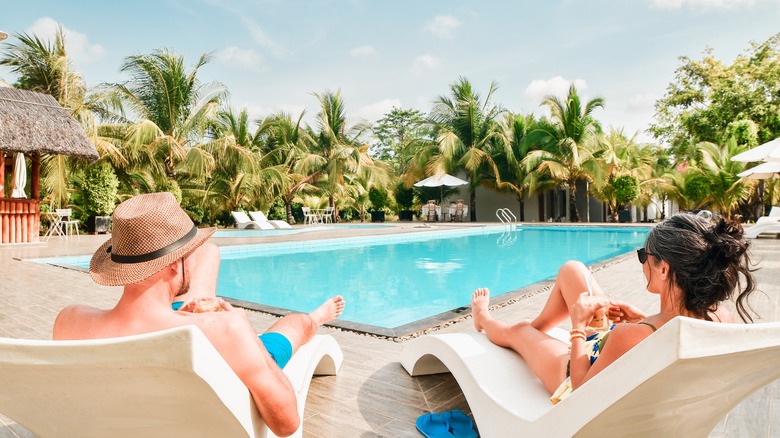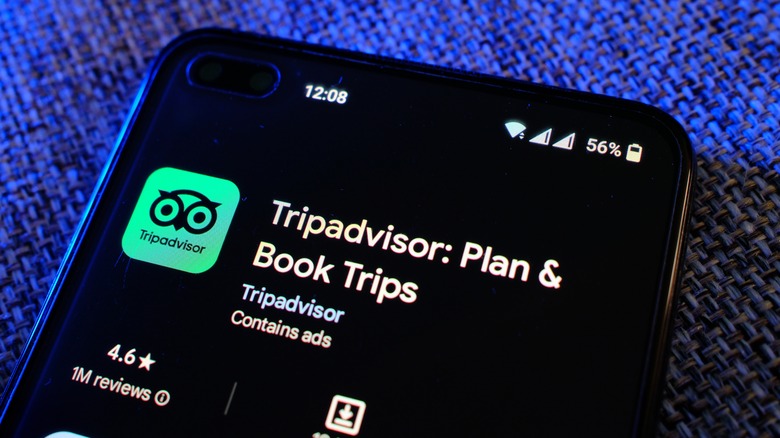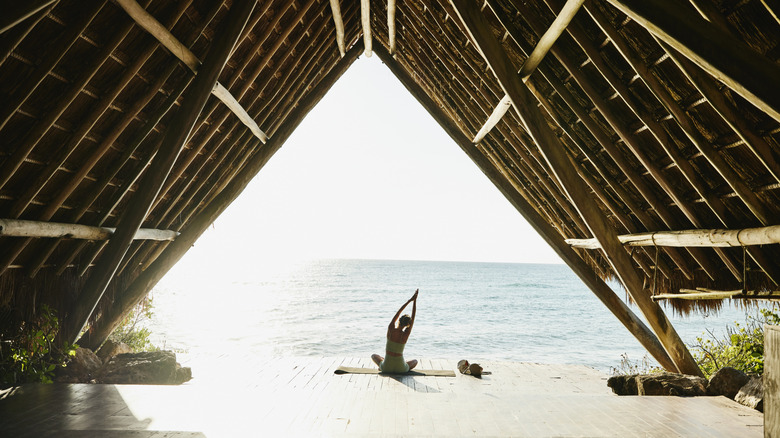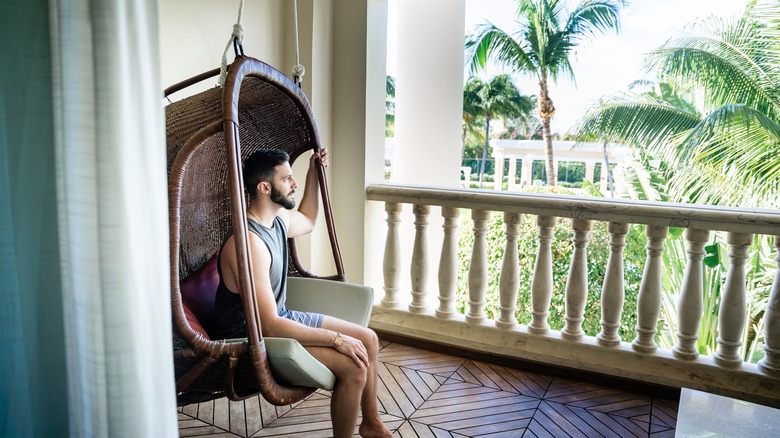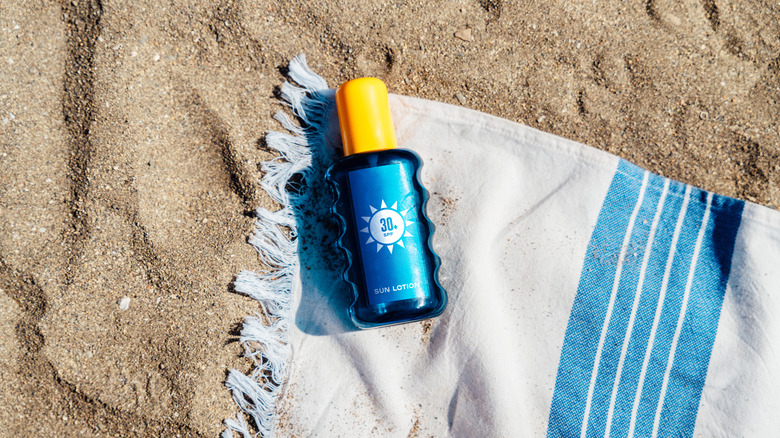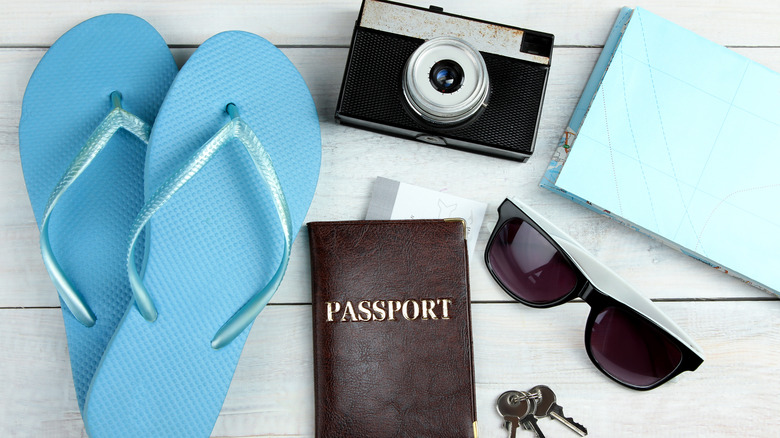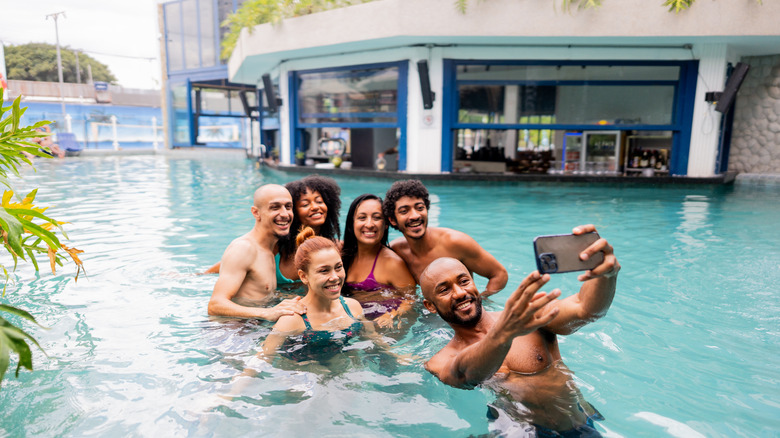The Most Common All-Inclusive Resort Mistakes That Will Ruin Your Destination Vacation
We may receive a commission on purchases made from links.
The all-inclusive is a resort package that so many hold in high regard. Endless fun in the sun and a non-stop supply of drinks and food throughout your days by the pool come with a single, upfront cost, and then concerns over the trip's budget largely fall by the wayside. An all-inclusive resort is a place of incredible enjoyment, and collectively, this type of hotel destination is seeing a surge in popularity. They make good budgeting sense for travelers hoping to lap it up in luxury, and provide an often unparalleled means of unwinding without any real plans or demands on your time.
However, problems can arise during your trip or even during the reservation process if you let one or more common all-inclusive mistakes creep into the vacation. The owner of luxury travel agency Vic's Vacations, Victoria Fricke, spoke exclusively with us to explore some of these sore spots. "There's an all inclusive for everyone," she offered. "Finding the hotel that matches your wish list is the key to being happy there. Make your wish list, define your preferences and goals for the experience, and ensure what you're picking matches that." Beyond a good match for your needs and expectations, Fricke gave us a wealth of information to chew on. Here are her most important action items to keep in mind when planning an all-inclusive destination trip.
Not using a travel advisor
The first piece of advice that Fricke gave us revolved around the planning phase of a destination vacation. Instead of doing it all by yourself, she suggests leaning heavily on a support system purpose-built to ensure your vacation goes off without a hitch. Travel advisors are the ideal partners when picking a great all-inclusive resort. Check out five secrets for finding the perfect travel agent.
The travel expert explains, "A travel advisor's job is to identify the right resort for a guest. To be a matchmaker of wish lists, budget, dates, desired experience, and you. My team and I visited 34 all-inclusive resorts in 2024 and sailed three different cruise ships. Why? To have first-hand experience and share with our clients exactly what the resort looks like, how the food is, what the vibe is like, and more. We travel to ensure your trip is what you think it will be."
By enlisting a travel professional to help plan and book the elements of your all-inclusive vacation, you'll spend more time excited about the experience and less time worrying about whether or not it will live up to the hype. This can make all the difference in your experience from start to finish.
Believing every review on Tripadvisor
Tripadvisor can be a fantastic source of crucial information. The site offers a platform for travelers to share their experiences, and for others planning a trip to gain key knowledge about hotels, restaurants, and destinations they're considering for their travel. But you can't simply trust Tripadvisor reviews at face value without context. Frick gives us more insight into this disconnect. "The reality of reviews is this: Most people don't go out of their way without an incentive to leave a positive review, but they'll move mountains to leave a negative one.
The truth is in the middle of the reviews. You have to sift through and find it. The travel agent also reminds us to keep our wits about us as we conduct this research: "Be mindful that you don't know the travel history of those posting. If it's their first all-inclusive, they may think it's incredible, but if they've been to five and are saying of all five, this one hands down has the worst buffet, that might have a bit of credibility."
Unfortunately, plenty of travelers have a tendency to read reviews and take them as a complete representation of the experience they might have in the hotel or elsewhere. These reports can be a great help in making sense of what an experience might be like. However, they shouldn't be taken as gospel.
Trusting resort photos
On the subject of online content, there's another damaging trap that travelers can easily fall into. Fricke notes that it's not just reviews and testimonials you should remain a little reserved about. Images and information posted by hotels themselves can sometimes be deceiving. "Bait and switch is real," Fricke says. "The photos resorts use have a range of false advertising. Some of them blatantly photoshop the beach experience to be drastically different than what it actually is. I've been to countless resorts where I scoff at the reality vs what has been depicted in marketing photos."
There's not a whole lot that can be done directly within the confines of the hotel's website to combat this kind of deception, but Fricke highlights an important resource. All travelers should look beyond the publicized images and descriptions that hotels put out themselves. Instead, she notes that travelers should "look up YouTube videos of the resort. Check out Instagram locations (to see what real people are posting in real time), and read reviews. Don't trust every review you read, though." Looking for images that others have posted of an all-inclusive will give you a more nuanced breadth of knowledge to make your decision more confidently.
Upgrading to club level when it's not worth it
Many all-inclusive resorts operate multiple tiers of access for guests. Sometimes this might be centered on premium drink packages or additional perks like reserved seating around the pool. Other club-level upgrades deliver far more exclusivity. However, not every club-level upgrade is worth it. "It costs more, so it must be better, is a misconception in the travel space," Fricke offers. "Many resorts have higher room categories that include elevated amenities and access to different areas of the resort. Often, this consists of a club lounge, exclusive pools, restaurants just for club guests, and beach areas. At some resorts, I would suggest, without a doubt, that the upgrade is worth it. At others, though, it's not. Doing your research (or having your travel advisor weigh in) can help you spend money where you should and save it where it's not necessary."
Fricke also goes into greater detail on this topic in an Instagram post. She offers an important piece of wisdom specifically surrounding exclusive areas. You might check into your hotel and immediately notice amenities like a rooftop pool or a luxury lounge that sit prominently in the resort's overall layout. These might be club-level exclusives that make you feel as if you made a mistake by not upgrading throughout your vacation. It is a big deal to know this in advance and plan accordingly before your arrival, either by springing for the upgrade or deciding you won't need it.
Choosing the wrong room category
Naturally, the room type you select can influence your vacation experience significantly. Fricke notes that many people don't take this decision as seriously as they should, but "Views and room location matter," she says. "There will always be the thought, 'I'm just sleeping here,' but if that means you can't open your curtains without looking into the popular walkway of guests heading to dinner, or your romantic soaking tub is looking at the entrance to the maintenance garage, your experience will be impacted."
Instead of discounting the importance of this selection, she suggests considering the cost of an amenity or requirement you can't compromise on when budgeting and planning for your trip. "It might be something within the interior, like a soaking tub; it could be a swim out; it could be a view. Prioritize the amount of time you'll spend enjoying that and budget appropriately. If an ocean view is something that will make your trip, go one less night to afford it."
Falling for the timeshare pitch
"If I can give you any advice, it's that the spa credit or tour they're offering in exchange for you to hear about their membership won't be worth it," Fricke cautions. It's one of her strongest pieces of advice throughout the entire conversation, and one that travelers will be wise to take on board. She continues, "Heed this warning: Timeshares sound great ... until they're not. A simple no, thank you, at the immediate sign of being offered this sales pitch will be your best bet."
The pitch can go on for much longer than the promised time limit, and may even leave you with a sour taste in your mouth after plenty of pressure to commit to something you never wanted to begin with. Instead of subjecting yourself to the aggressive sales pitch for the sake of a few bucks off a treatment or excursion, just stay by the pool and enjoy your time at the resort. We have sat through one of these pitches and can attest to the discomfort created on an otherwise relaxing and immensely fun vacation.
Not packing enough sunscreen
Sunscreen is a must-have accessory. Across the entirety of expensive and cheap global destinations for all-inclusive resorts alike, travelers seek plenty of sun and a distinct limit on cloud cover (and even worse, rain). "The sun is your best friend and worst enemy on a trip, and there's nothing worse than spending $30 on aloe vera plus another $28 more on sunscreen in the gift shop," Fricke offers.
Packing enough sunscreen can help you avoid expensive purchases later, but judging how much is enough can be tricky. "My rule of thumb is ½ bottle per day per couple. If you have kids, double that. It sounds excessive, but you'd much rather come home with two unused bottles of sunscreen than wince at the idea of being back in the sun." Additionally, Fricke encourages packing a hat and sun protective clothing, or any breathable shirt for coverage when the sun is at its peak during the day.
Foregoing water (especially in favor of additional alcoholic drinks)
Upon checking in at your all-inclusive, you'll almost certainly want to head straight to the pool. Here, a smattering of food and beverage options will be available, all without pulling out your wallet. It's tempting to dive right into the inclusions. "The idea of endless margaritas sounds like a good idea, until it's not. Alcohol is included at an all-inclusive, but it doesn't mean you need to drink your weight in it. Have fun and enjoy the carefree experience, but excessive alcohol, limited water, overly sweet drinks, and all day in the sun is a bad mix for many vacationers. Take a break and ensure you hydrate along with your fun. Simply ask your waiter or bartender to bring water with each drink. Think about bringing electrolyte packs, too!"
Hydration is essential in daily routines at home, and it's perhaps even more important when you're off on a vacation (as well as when you're flying to or from an extravagant destination). Headaches and other complications that stem from dehydration can dampen the excitement of your trip. Yet, water is also free and readily available at an all-inclusive, so there's really no reason not to get enough of it into the mix. Tip: You should read why you should drink lots of water while flying.
Not bundling flights with your hotel
Failing to at least explore bundle options for your trip is an airline booking mistake you probably don't know you are making. It might seem like an unnecessary step, but the price difference can be stark. "If you have miles or points, I get wanting to use them, but in the all-inclusive space, you can often bundle air and hotel to get a much better price than if you had bought both separately! A travel agent can help secure the best pricing," Fricke suggests. At the bare minimum, it's always a good idea to tease out the options you have available to you. Doing some research can be a good starting point, and Fricke even notes some options for going the self-service route entirely: "If you wish to book on your own, use a website like Funjet Vacations to help you find the best pricing!"
Whether you begin the planning alone or not, your travel advisor can be a major resource in your corner here. The logistics of each moving part in a vacation can easily become overwhelming. This is especially true for travelers who aren't frequently on the move and may be less experienced with various booking services and itinerary planning sites. It might ultimately make sense to keep these reservations separate in some cases, but bundling them frequently delivers great value that can save you money or free up additional funding to spend on a room upgrade or an extra excursion.
Failing to buy travel insurance
Travel insurance is a polarizing issue. Some travelers swear by the coverage, while others have never bought a policy. The reality is that Single-trip Travel Insurance (What is it and when should you use it?) is a safety net that can save an important vacation in a variety of ways. Cancel for Any Reason Insurance (Is it worth it?) is a comprehensive option that's also on the table. It delivers even greater peace of mind to protect your wallet against potential hang-ups as your trip approaches.
Fricke is firmly in the pro-insurance camp and says, "You never know what your travel day will bring. How the weather will cooperate. If a kid will get sick. Travel insurance allows you to navigate the unexpected, with the safety and security you have help. When buying a vacation package, you can select insurance at checkout. If you're piecing the trip together, you can buy a third-party coverage like Arch." Having this coverage in your back pocket allows you to roll with the punches if something goes awry while making your connecting flight, or even if you need to back out of the trip altogether because of an emergency. This coverage doesn't have to be expensive, and it can take your mind off the bevy of potentially vacation-altering calamities that might descend on you and your travel group.
Posting live updates or your location details while away
Vacation posts are a seemingly harmless and fun way to share your exploits with friends. "It's exciting to be on vacation and share your every move on social media," Fricke admits. Most travelers have posted about their adventures at least once in the past, sharing routine updates with friends and family. This is especially tempting if you're living it up at a beautiful resort or engaging in exciting activities like scuba diving or riding horses along the beach. But there's a darker side to these kinds of updates that many people won't have thought about as they hit send on their latest picture or post.
Fricke says, "be mindful as it opens your home up to uninvited and ill-intentioned guests. Share your experience and those incredible photos once you're home," instead of posting throughout your time away. Posting pictures poolside is just a part of modern life, but those looking for an opportunity to take advantage of people in your local area back home may also catch wind of your updates. If you publicize that you're away on an extravagant vacation, you may ultimately be telegraphing that no one is at home to protect your belongings.
Leaving out a few key extras in your packing list
Forgetting important extras when compiling your packing list is something that can happen ahead of nearly any trip. But those essential extras differ depending on where you're going. For an all-inclusive, Fricke suggests two important packing additions. First of all, "Nothing is worse than a pina colada with a paper straw. Many resorts have gone green with paper straws or no straws. Bring your own! I'd suggest silicone or plastic, avoiding metal as it can get hot," she says.
Her other essential is far less exciting but no less important. "Bring a carbon monoxide detector. This is a morbid tip, but one that saves lives. Resorts undergo significant maintenance daily to stay in great operational shape, but problems arise every year at all-inclusive resorts due to faulty AC units. A travel carbon monoxide detector is $35 online and worth every penny." These two small items slipped into your suitcase might seem somewhat insignificant, but each one can improve your experience, albeit in different ways.
Failing to account for tips in your budget
Finally, Fricke adds that tipping is an important feature travelers shouldn't forget when jetting off to an all-inclusive. "At most resorts, tips are not included. The staff is incredible and works so hard. Be sure to bring a few hundred dollars for tips," she says. Tipping is standard practice at restaurants and other establishments back home, and this gratitude shouldn't fall by the wayside just because you're away. With that being said, resorts in Europe may feature a different norm surrounding tipping culture than all-inclusive options in America or elsewhere.
Regardless of where you land for your vacation, tipping is a great way to thank the people who make your trip memorable. Resort staff are constantly on the go, delivering entertainment and bringing food and drinks to guests throughout the day. Opening your wallet to show your thanks gives them an important addition to their base income and shows the staff you interact with that you care about them, too.
